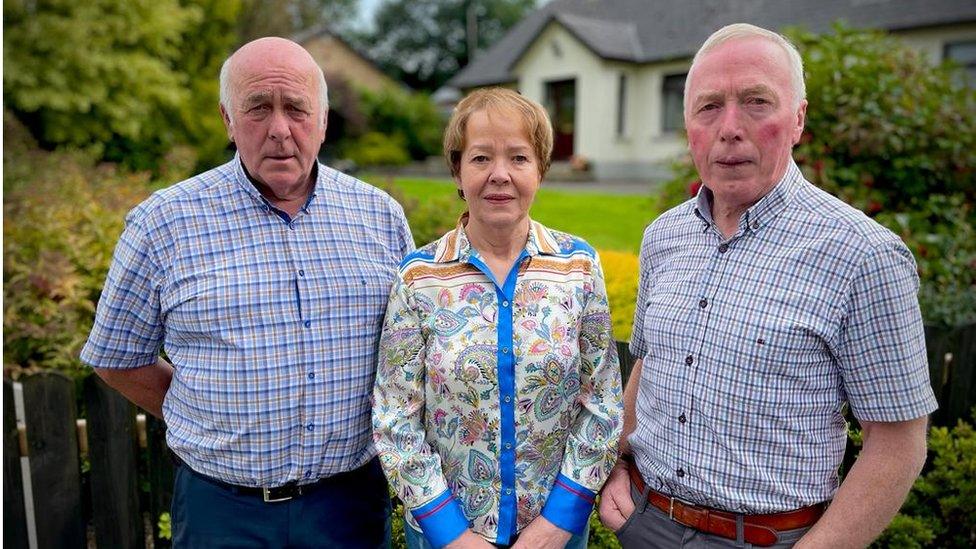NI Troubles: Legacy bill means 'a generational trauma will remain unresolved'
- Published
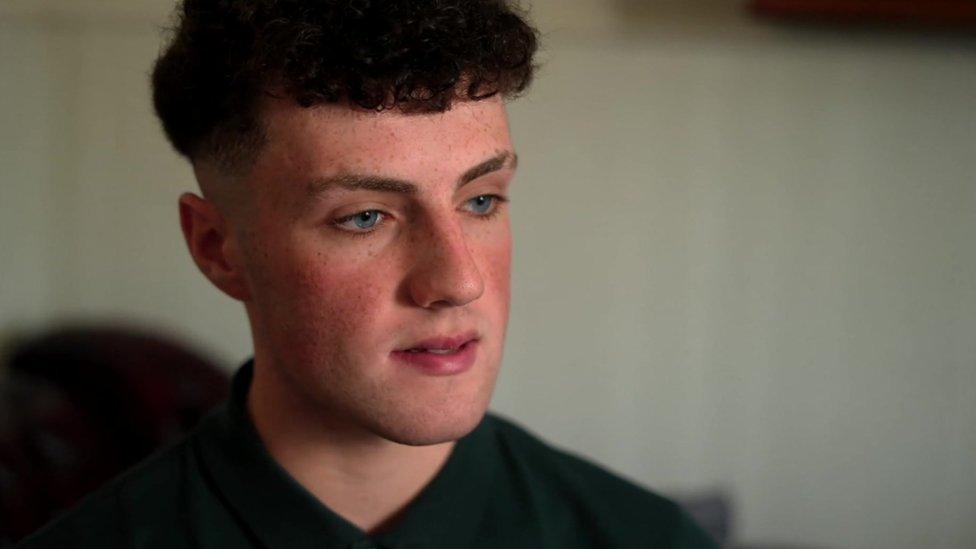
Dualtach Mag Fhionnbhairr said his family's goal was finding the truth
Dualtach and Barra Mag Fhionnbhairr are now around the same age as their uncles were when they were murdered.
The teenagers weren't born when Gerard and Rory Cairns were killed in 1993.
However, the issue which is often referred to in Northern Ireland as "dealing with the past" isn't history to them.
I met Dualtach and Barra in their grandparents' house near Lurgan in County Armagh.
They told me what happened there almost 30 years ago.
"It was my Auntie Róisín's 11th birthday, and there was a bit of a party," said Dualtach.
'They were just watching TV'
"Two gunmen came in through the front door and told Róisín to be quiet inside the kitchen here."
Pointing through to the living room, he went on: "Gerard and Rory were just watching TV in there. The men went in and just shot both of them dead."
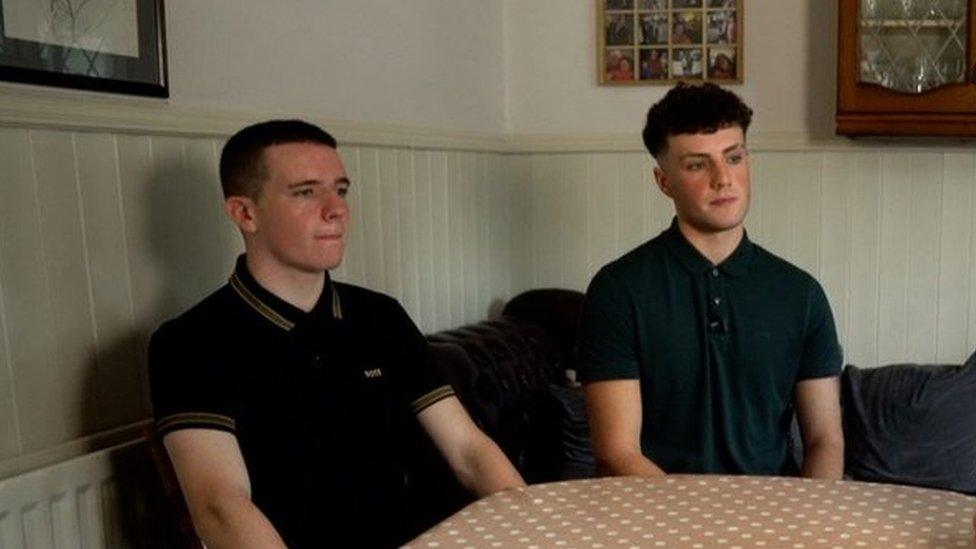
Barra and Dualtach Mag Fhionnbhairr, whose uncles were murdered, told BBC Ireland correspondent Chris Page the legacy bill is "cruel"
Gerard was 22 and Rory was 18.
They were two of almost 4,000 people who were killed during the conflict known as the Troubles.
It lasted for three decades and largely ended with a peace agreement in 1998.
But the question of how many hundreds of unsolved killings should be investigated remains highly complex and controversial.
The British government is giving the massive caseload to a new agency - the Independent Commission for Reconciliation and Information Recovery (ICRIR).
However, almost all victims' groups are strongly opposed to the legislation setting out how it will operate.
The most contentious aspect is a provision for suspects to be granted immunity from prosecution - in other words, a conditional amnesty - in return for providing information to the ICRIR.
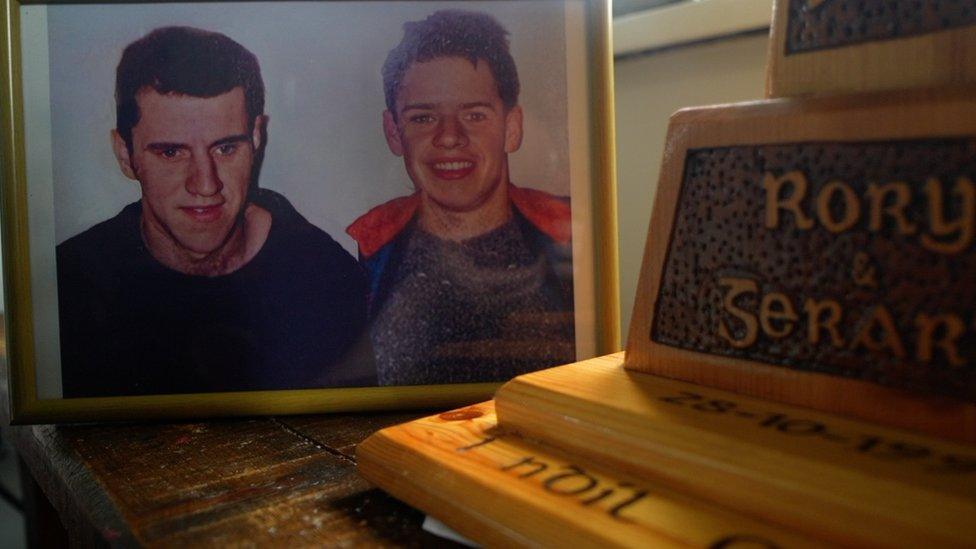
Gerard and Rory Cairns, who were aged 22 and 18, were killed by the UVF in 1993
The bill, which is set to pass its final parliamentary stage this week, will also bring an end to civil court cases and inquests linked to the Troubles.
Ministers in London argue the bill offers the best prospect for bereaved families to find out facts about what happened to their relatives.
But that is disputed by the bill's critics.
'My mother's trauma is my trauma'
Dualtach and Barra's strength of feeling led them to decide to speak in public for the first time about their uncles' deaths.
The family are supported by the campaign group Relatives For Justice.
Barra, who is 17, said: "I'm the youngest of the family and I've seen through my entire life how my family has campaigned for justice for Gerard and Rory.
"I believe this legislation is completely cruel and unjust."
Eighteen-year-old Dualtach added: "It's completely unfair to draw a line in the past.
"My mother's trauma would be her children's trauma - that's my own trauma.
"If justice isn't served, it will be a generational trauma and remain unresolved. Everyone has the right to a proper investigation, a proper inquest, the truth."
The Cairns brothers were murdered by the Ulster Volunteer Force (UVF).
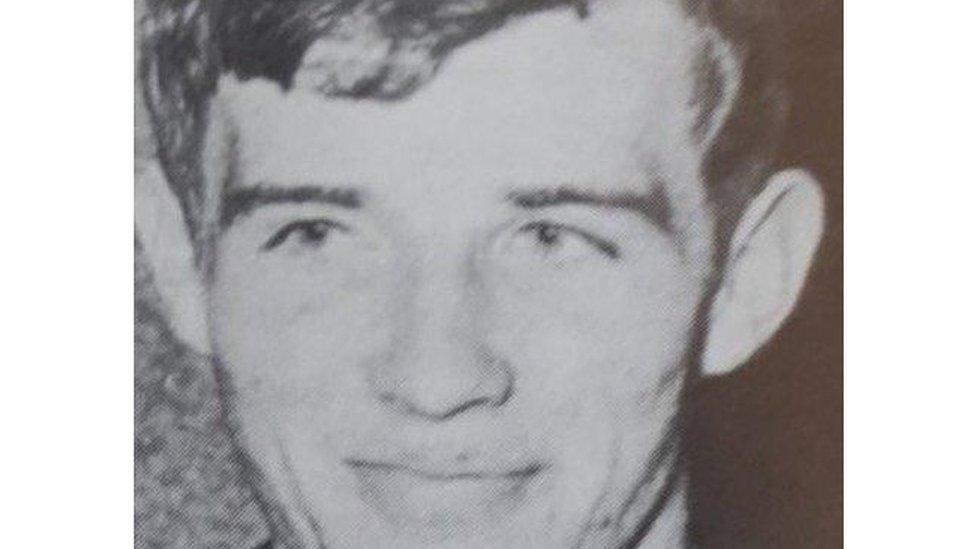
Constable Robert Laverty was murdered in 1972
It was a loyalist paramilitary group - an armed organisation which wanted Northern Ireland to remain part of the UK.
The worst year of the Troubles in terms of death toll was 1972.
The month in which most people died was July: Constable Robert Laverty was one of almost 100 people who were killed.
His brother Shane was 10 at the time. "I looked up to all my brothers as semi-heroes," he told me.
I met Shane on the promenade in Ballycastle, the family's home town by the sea in County Antrim.
"My dad died three months after I was born," he told me, "so my mother brought up the seven of us alone."
Shortly before Robert was murdered, Shane remembers going for a ride with Robert in his newly purchased first car.
"It was a Ford Escort Mark One. FIA 250 was the number plate."
Robert was 18 when he was shot dead by the Irish Republican Army (IRA).
'Huge sense of injustice'
It was the largest of the paramilitary groups which wanted Northern Ireland to sever connections with Britain and become part of the Republic of Ireland.
Shane - who's involved with the South-East Fermanagh Foundation victims' group - opposes to the government's legislation because "there's a huge sense of injustice."
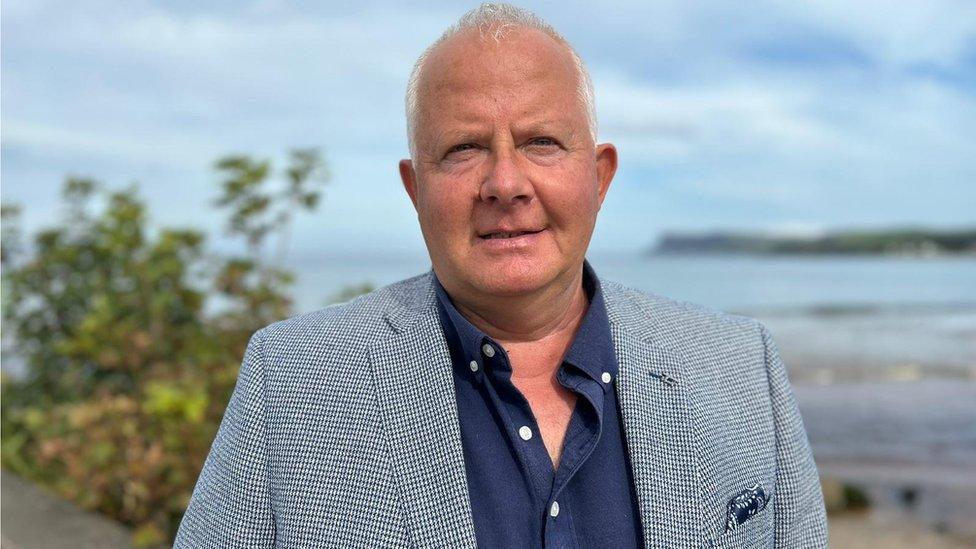
Shane Laverty was 10 when his brother Robert was killed by the IRA
"Perpetrators have been conflated with the people they went out to maim and kill. I think the government should have kept that separate.
"What we're looking at here is an amnesty for murder."
He said it would be unimaginable for members of groups such as al-Qaeda to be given immunity from prosecution.
"This wouldn't be acceptable in England, Scotland and Wales, yet here in Northern Ireland it has been foisted upon us."
'Dangerous precedent'
Political parties in Northern Ireland have very different analyses of the conflict but all oppose the bill.
There has been criticism, too, from international human rights watchdogs - including United Nations special rapporteurs and the Council of Europe.
Grainne Teggart, from the campaign organisation Amnesty International, expressed concern that the legislation would set a "dangerous precedent".
"It has provided a blueprint for state forces and illegal armed groups to be let off with very serious crimes," she said.
The government has argued the provision for immunity from prosecution will help the ICRIR to gather valuable information for families who presently don't know the truth about killings.
Northern Ireland minister Lord Caine said the passage of time meant that the prospect of successful prosecutions was "vanishingly rare", adding that "the best we can offer in those circumstances is to get more information to people".
He stressed that the legislation did not give "blanket immunity" in all cases.
"It's a conditional immunity scheme. That means that if someone is questioned by the commission and doesn't co-operate, or willingly misleads, they will not be eligible for immunity.
"They will still be able to be prosecuted in the normal way."
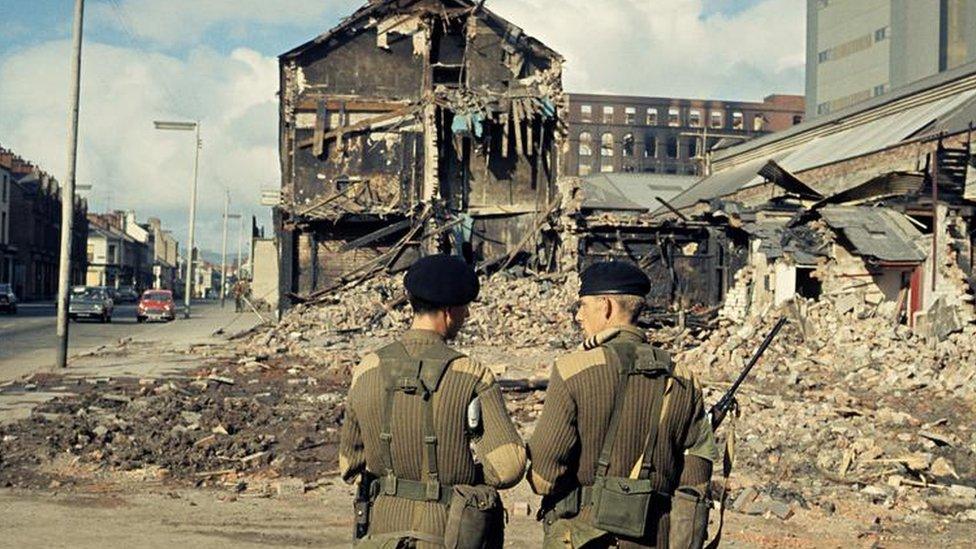
The Troubles was a period of conflict which lasted for 30 years and cost the lives of more than 3,500 people
About six in 10 of the killings were carried out by Irish republican paramilitaries.
Loyalists were behind about three in 10, while the security forces were responsible for approximately one in 10 killings.
'Veterans need protection'
The former head of the British Army, Lord Dannatt, told The World Tonight on BBC Radio Four that he was "fully sensitive" to the opposition to the bill.
But he said a "beneficial side-effect" of the legislation was that it would "remove a lot of worry for older soldiers".
"Of course there were cases where soldiers were wrong, and the full force of the law should be brought down upon them.
"But the vast majority of veterans did their duty, and they need some protection."
A number of the bill's opponents claim its primary purpose is to cover up state wrongdoing.
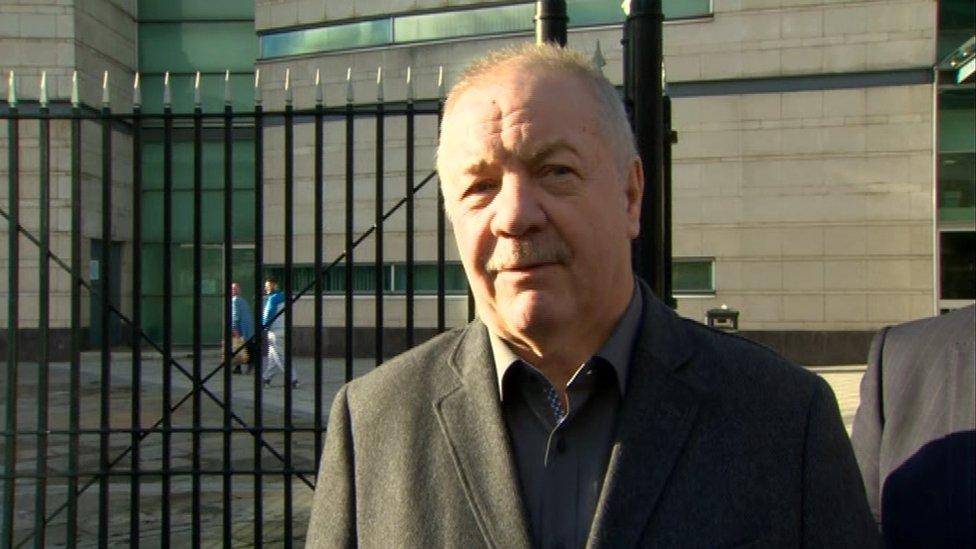
Mr McCord has called for a public inquiry to be heard into his son's death
That is vigorously denied by the government.
Now the legislation is moving out of the political process and is set to land in the courts.
Victims' relatives are preparing legal challenges against the plans.
Raymond McCord, whose son Raymond Jr was murdered by the UVF in 1997, has already begun a case.
He said: "There is a long way to go yet but I believe this is how we defeat this bill."
Some campaigners - including the family of Gerard and Rory Cairns - want the Irish government to take a case against the UK in the European Court of Human Rights.
The Irish Prime Minister, the Taoiseach Leo Varadkar, has underlined that he firmly disagrees with London's plans, and his most senior legal advisor is considering whether an "inter-state" challenge should be launched.
Any case would test if the legislation is in line with the state's duty to protect the right to life.
This is the focus of Article 2 of the European Convention on Human Rights, of which the UK is a signatory.
Lord Caine said the British government was "confident" the legislation was compatible with the convention.
He said he would amended the bill to ensure the ICRIR, which is due to begin work fully next May, would have to act in accordance with human rights law.
The question of how killings from the Troubles should be investigated has always been one of the most emotive and difficult issues in Northern Ireland.
In the coming months, it could attract more global attention than ever.
Related topics
- Published3 January 2023

- Published5 September 2023
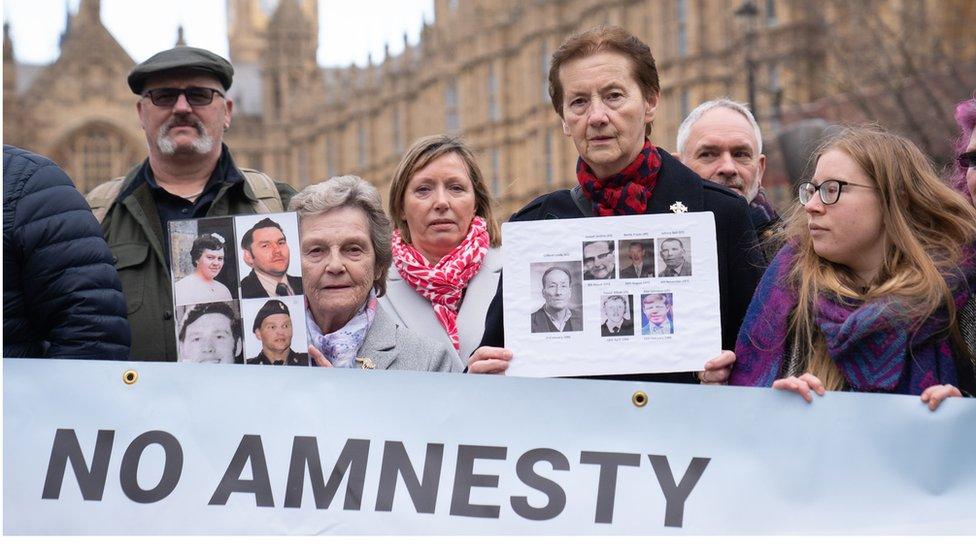
- Published5 September 2023
